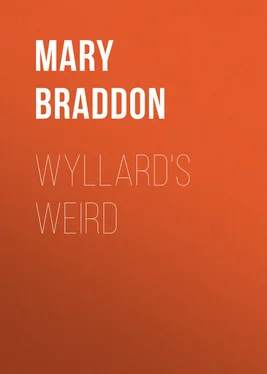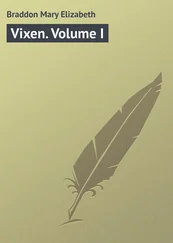Mary Braddon - Wyllard's Weird
Здесь есть возможность читать онлайн «Mary Braddon - Wyllard's Weird» — ознакомительный отрывок электронной книги совершенно бесплатно, а после прочтения отрывка купить полную версию. В некоторых случаях можно слушать аудио, скачать через торрент в формате fb2 и присутствует краткое содержание. Издательство: Иностранный паблик, Жанр: foreign_antique, foreign_prose, на английском языке. Описание произведения, (предисловие) а так же отзывы посетителей доступны на портале библиотеки ЛибКат.
- Название:Wyllard's Weird
- Автор:
- Издательство:Иностранный паблик
- Жанр:
- Год:неизвестен
- ISBN:нет данных
- Рейтинг книги:3 / 5. Голосов: 1
-
Избранное:Добавить в избранное
- Отзывы:
-
Ваша оценка:
- 60
- 1
- 2
- 3
- 4
- 5
Wyllard's Weird: краткое содержание, описание и аннотация
Предлагаем к чтению аннотацию, описание, краткое содержание или предисловие (зависит от того, что написал сам автор книги «Wyllard's Weird»). Если вы не нашли необходимую информацию о книге — напишите в комментариях, мы постараемся отыскать её.
Wyllard's Weird — читать онлайн ознакомительный отрывок
Ниже представлен текст книги, разбитый по страницам. Система сохранения места последней прочитанной страницы, позволяет с удобством читать онлайн бесплатно книгу «Wyllard's Weird», без необходимости каждый раз заново искать на чём Вы остановились. Поставьте закладку, и сможете в любой момент перейти на страницу, на которой закончили чтение.
Интервал:
Закладка:
The carriage drove slowly up a long hill, and across a wide expanse of heathy ground, before it entered the gate of Penmorval, which was two miles from the town. It was a beautiful old place, standing on high ground, yet so richly wooded as to be shut in from the outer world. Only the Cornish giants, Roughtor and Brown Willie, showed their dark crests above the broad belt of timber which surrounded the good old Tudor mansion. A double avenue of elms and yews led to the old stone porch. The long stone façade facing northward looked out upon a level lawn divided from the park by a haw haw. The southern front was curtained with roses and myrtle, and looked upon one of the loveliest gardens in Cornwall – a garden which had been the pride and delight of many generations – a garden for which the wives and dowagers of three centuries of Cornish squires had laboured and thought. Nowhere could be found more glorious roses, or such a treasury of out-of-the-way flowers, from the finest to the simplest that grows. Nowhere did April sunlight shine upon such tulips and hyacinths, nowhere did June crown herself with fairer lilies, or autumn flaunt in greater splendour of dahlias, hollyhocks, and chrysanthemums. The soil teemed with flowers. There was no room left for a weed.
For a childless wife like Dora Wyllard a garden such as this is a kind of spurious family. She has her hopes, her fears, her raptures and anxieties about her roses and chrysanthemums, just as mothers have about their girls and boys. She counts the blossoms on a particular Gloire de Dijon . She remembers the cruel winter when that superb John Hopper succumbed to the frost. She has her nostrums and remedies for green-fly, as mothers have for measles. That glorious old garden helped to fill the cup of Mrs. Wyllard's happiness, for it gave her inexhaustible employment. Having such a garden she could never say, with the languid yawn of the idle and the prosperous, "What can I do with myself to-day?" But Dora was not dependent on her garden for occupation. Exacting as the roses and lilies were, manifold as were the cares of the hothouses and ferneries and wildernesses, Mrs. Wyllard's husband was more exacting still. When Julian was at home she could give but little time to her garden. He could hardly bear his wife to be out of his sight for half an hour. She had to be interested in all his schemes, all his letters, even to the driest business details. She rode and drove with him, and, as he had no taste for field sports, neither his guns nor his hunters took him away from her. He was a studious man, a man of artistic temperament, a lover of curious books and fine bindings, a lover of pictures and statues, and porcelain and enamels – a worshipper of the beautiful in every form. His tastes were such as a woman could easily and naturally share with him. This made their union all the more complete. Other wives wondered at beholding such domestic sympathy. There were some whose husbands could not sit by the domestic hearth ten minutes without dismal yawnings, men who depended upon newspapers for all their delight, men whose minds were always in the stable. Julian Wyllard was an ideal husband, who never yawned in a tête-à-tête with his wife, who shared every joy and every thought with the woman of his choice.
To-night, when they two sat down to the half-past, nine o'clock meal, with Bothwell, who was not much worse than a Newfoundland dog, for their sole companion, the wife's first question showed her familiarity with the business that had taken her husband to London.
"Well, Julian, did you get the Raffaelle?" she asked.
"No, dear. The picture went for just three times the value I had put upon it."
"And you did not care to give such a price?"
"Well, no. There are limits, even for a monomaniac like me. I had allowed myself a margin. I was prepared to give a hundred or two over the thousand which I had put down as the price of the picture; but when it went up to fifteen hundred I retired from the contest, and it was finally knocked down to Lamb, the dealer, for two thousand guineas. A single figure – a half-length figure of Christ bearing the cross, against a background of vivid blue sky. But such divinity in the countenance, such pathetic eyes! I saw women turn away with tears after they had looked at that picture."
"You ought to have bought it," said Dora, who knew that her husband had a great deal more money than he could spend, and who thought that he had a right to indulge his own caprices.
"My dearest, as I said before, there are limits," he answered, smiling at her enthusiasm.
"Then you had your journey, and I had to endure the loss of your society for three dreary days, all for nothing?" said Dora.
"Not quite for nothing. There was the pleasure of seeing a very fine collection of pictures, and some magnificent Limoges enamels. I succeeded in buying you a little Greuze. I am told by French art-critics that it is a low thing to admire Greuze, the sign of a vulgar mind. He is the painter of the bourgeois , the épicier . But, for all that, you and I have agreed to like Greuze; so I bought this little picture for your morning-room. I got it for five hundred and fifty, and I believe it is a genuine bit in the painter's best manner."
"How good you are to me!" exclaimed Dora, getting up and going over to her husband.
She bent down to kiss him as he sat at the table. They had dismissed the servants from this informal meal, so Mrs. Wyllard was not afraid of being considered eccentric, if she showed that she was grateful. She did not mind Bothwell. Five hundred and fifty! How freely this rich man talked of his hundreds, as it seemed to Bothwell, pinched by the consciousness of debts which the cost of that picture would have covered – little seedlings of debts, scattered long ago by the wayside, and putting forth perennial flowers in the shape of unpleasant letters from creditors, which made him hate the sight of the postman.
Neither Wyllard nor Grahame ate a hearty meal. That picture of the dead face was too vividly present in the minds of both. Meat and drink and pleasant talk were out of harmony with that horror which both had looked upon three hours ago. They took more wine than usual, and hardly ate anything.
"Will you come for a stroll in the garden, Julian?" asked Dora, as they rose from the table.
It was half-past ten o'clock, a lovely summer night. A great golden moon was shining low down in the purple sky, just above the bank of foliage: not that far-off moon which belongs to all the world, but a big yellow lamp lighting one's own garden.
"Do come," she said, "it is such a delicious night."
"I dare not indulge myself, dear; I have my letters to open before I go to bed. I was just going to order a fire in the library."
"A fire, on such a night as this! I'm afraid you have caught cold."
"I think it not unlikely," answered her husband, as he rang the bell.
"Don't you think your letters might keep till to-morrow morning, Julian?" pleaded Dora. "We could have a fire in the morning-room, and sit and talk."
"That would be delightful, but I must not allow myself to be tempted. I should not rest to-night with the idea of a pile of unopened letters."
He gave his orders to the servant. His letters and papers were all on the library table. A fire was to be lighted there immediately.
"You will be late, I am afraid," said Dora.
"I may be a little late. Don't wait up for me on any account, dearest. Goodnight!"
He kissed her; and she said good-night, but reserved her liberty to sit up for him all the same. There is no use in a husband saying to a wife of Mrs. Wyllard's temperament, "Don't sit up for me, and don't worry yourself!" Sleep was impossible to Dora until she knew that her husband was at rest; just as happiness was impossible to her when parted from him. She had made herself a part of his being, had merged her very existence in his; she had no value, hardly any individuality, apart from him.
Читать дальшеИнтервал:
Закладка:
Похожие книги на «Wyllard's Weird»
Представляем Вашему вниманию похожие книги на «Wyllard's Weird» списком для выбора. Мы отобрали схожую по названию и смыслу литературу в надежде предоставить читателям больше вариантов отыскать новые, интересные, ещё непрочитанные произведения.
Обсуждение, отзывы о книге «Wyllard's Weird» и просто собственные мнения читателей. Оставьте ваши комментарии, напишите, что Вы думаете о произведении, его смысле или главных героях. Укажите что конкретно понравилось, а что нет, и почему Вы так считаете.












